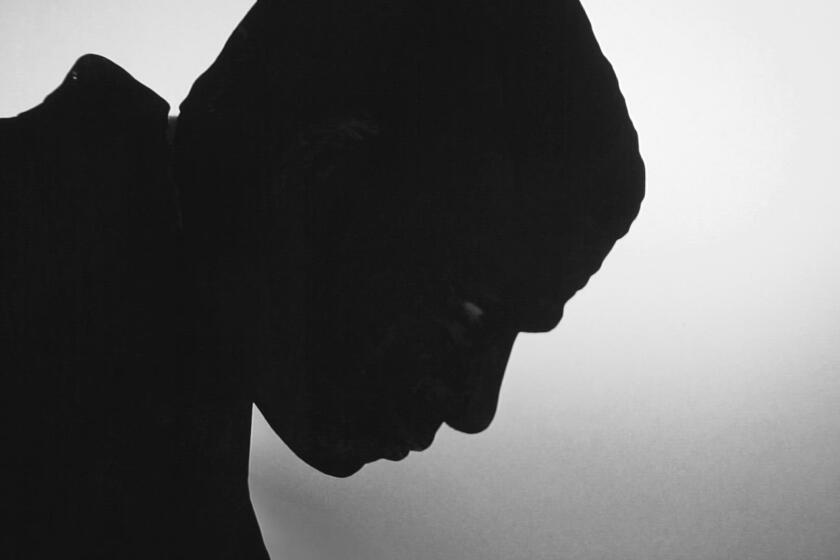What makes Joel Coen’s Shakespeare unique: His ‘Macbeth’ is haunted by other movies
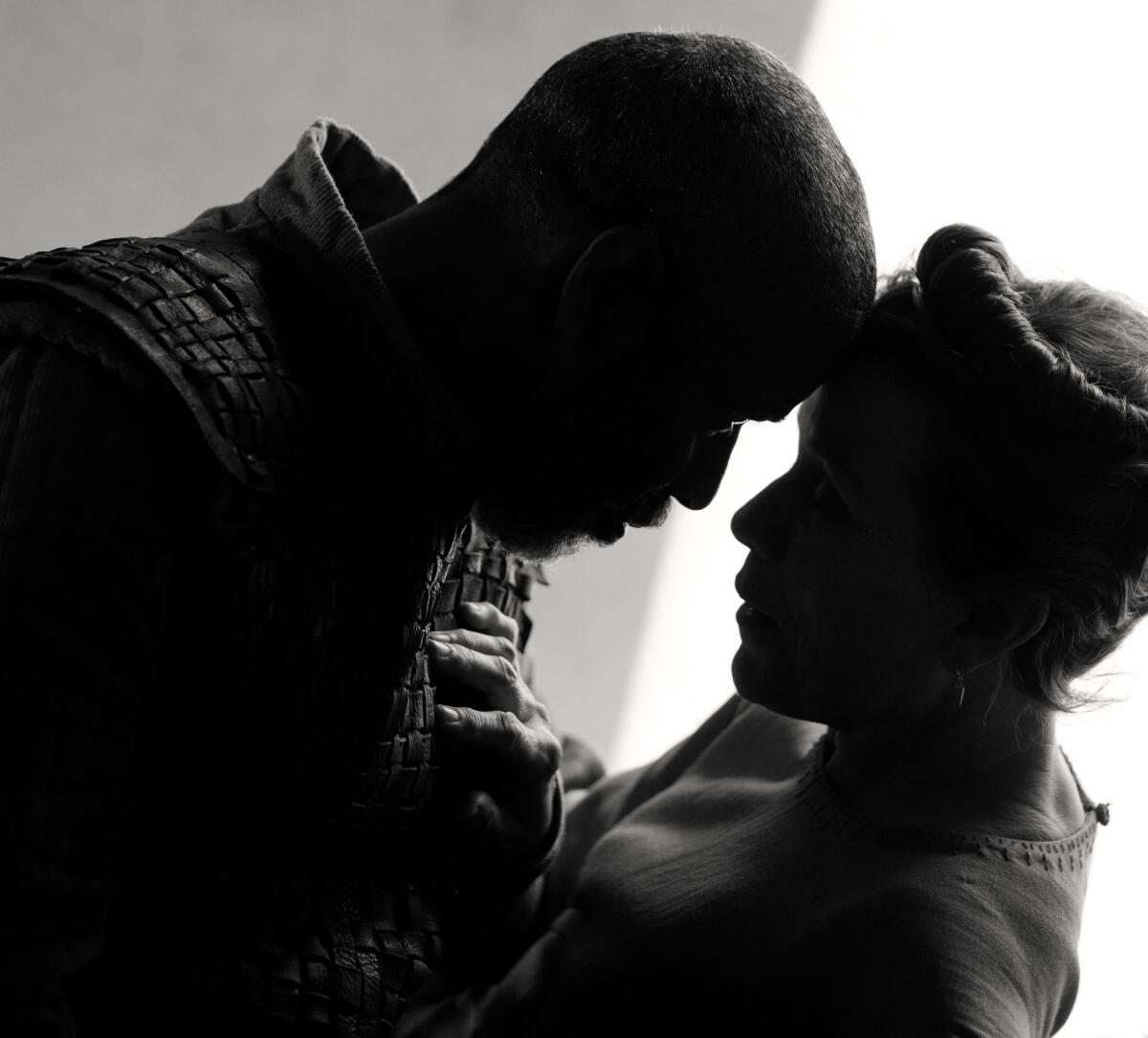
- Share via
The focus of Joel Coen’s “The Tragedy of Macbeth,” which starts streaming today on Apple TV+, naturally falls on Denzel Washington and Frances McDormand, who star as an older-than-usual Macbeth and Lady Macbeth.
But lurking through the film is an attention-grabbing figure, as sinister as he is striking, who seems to be fighting on both sides of the battle between good and evil. The mystery of his identity may have some viewers feeling the need to brush up their Shakespeare. A good place to start would be Roman Polanski’s 1971 film of “Macbeth.”
Ross isn’t usually considered one of the plum supporting roles in Shakespeare’s play, at least not compared with Banquo or Macduff. But Coen invests the character with diabolical purpose, giving him a hand in the machinations that only escalate after Macbeth murderously seizes the throne.
Dressed sleekly in black, his goatee walking a fine line between sexy and sociopathic, Alex Hassell’s Ross moves from the murky periphery of the new film to the center of the action. He’s like a shadow version of “Macbeth,” a political operator cloaked in ambiguity waiting for his opportunity to pounce.
Inside Joel Coen’s solo venture, after a career co-directing with his brother Ethan, to film Shakespeare’s ‘Macbeth’ with Denzel Washington and Frances McDormand.
Coen follows Polanski’s lead in making Ross the third murderer, whose identity is one of the puzzles of Shakespeare’s tragedy. Macbeth commissions two desperate men to kill Banquo but a third mysteriously appears when it’s time to do the job. He says that he’s been sent by Macbeth but reveals little else.
Significantly, this unnamed character knows the grounds of the castle well and is readily able to identify Banquo when he appears. Speculation has centered on Ross, Lennox (another thane) and even Macbeth himself in disguise. If I were casting the part, I’d have the actor playing the devilishly named Seyton, Macbeth’s loyal servant who appears briefly in the final act, assume the part.
Textually, it’s hard to make a case for Ross, Lennox or Macbeth, as all three are in attendance at the banquet in which Macbeth receives the news that Banquo has been slain but not his son, Fleance, who managed to escape. The first murderer who delivers this mixed report in Shakespeare’s play has Banquo’s blood still freshly splattered on his face. Clearly there hasn’t been time for him to wipe his forehead, never mind for one of the assassins to dress up for a state dinner.
But Coen’s moviemaking instincts guide him in ratcheting up the intrigue in a meticulously art-directed black-and-white film that is deeply indebted to other movie versions of Shakespeare’s tragedy. Indeed, the conversation Coen has with other screen adaptations of “Macbeth” (including Orson Welles’ choppy 1948 spectacular, Akira Kurosawa’s magnificent 1957 “Throne of Blood” and Polanski’s sexy slaughterhouse) is more satisfying than his engagement with the play itself.
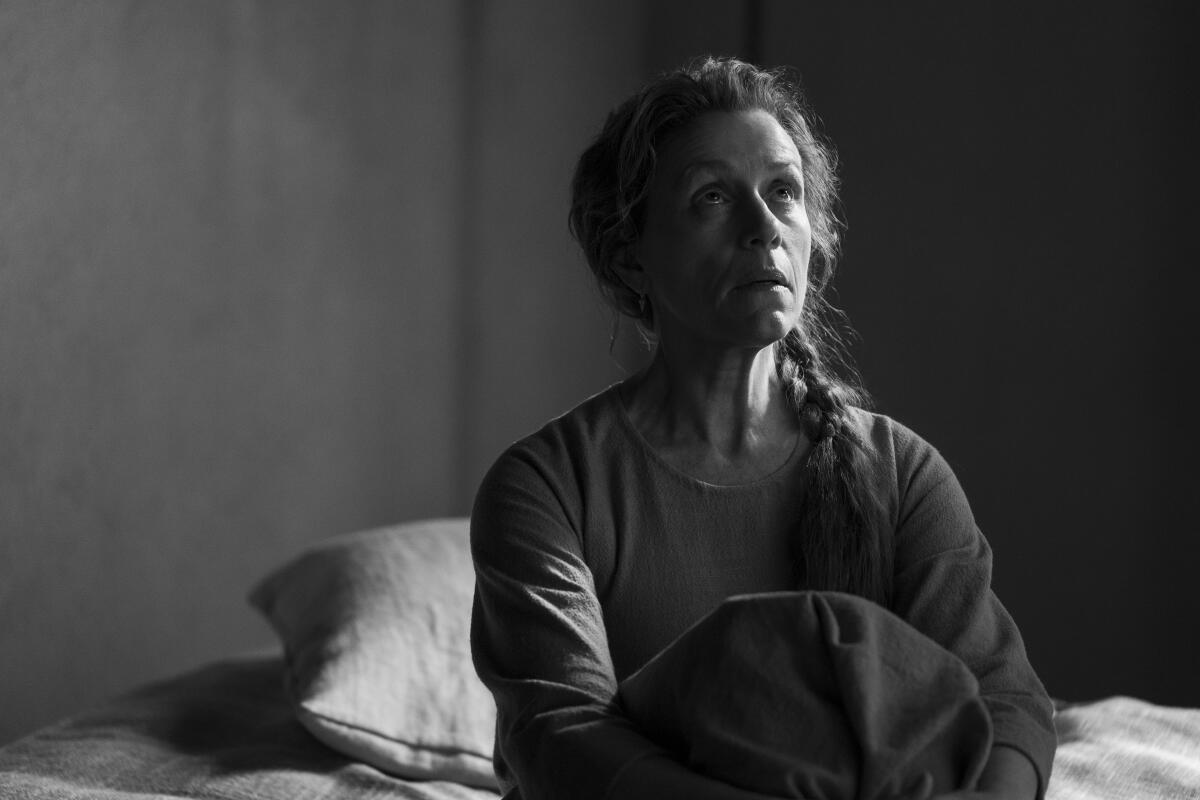
This is not meant as a slam. As a reading of the play, Coen’s film, while circumscribed, is full of provocative ideas. In casting the Macbeths with actors in their 60s, he makes the childless couple’s story less about ambition than legacy. Macbeth laments that the crown he has nefariously won is “fruitless.” Death is palpable in Washington’s weary stare. McDormand’s Lady Macbeth pushes her husband toward a last gasp of greatness as much to fend off her own fears of mortality as his own.
War, the crucial context from which the evil in the play naturally emerges, is given short shrift. (Polanski’s film, by comparison, shows these Scots as debauched with battlefield blood.) The weird sisters, incarnated in the mesmerizing, smoky-voiced performance art of Kathryn Hunter, seem as much a fact of the natural world as the crows circling the gunmetal sky. (Indeed, the witches transform themselves into birds, a feat made more plausible by Hunter’s contortionist skills.)
Washington’s Macbeth is obviously susceptible to temptation. He broods on the prophecy that he will one day be king, the prospect awakening what is clearly a deep-seated desire. In Shakespeare’s play, the occult is an expression of what already inheres in the protagonist’s psychology. But here the darkness presses in on him. It’s notable that when he wishes to consult with the witches after he’s king, they come directly to him. Those wicked crows are never out of sight for long.
These interpretive moves didn’t coalesce for me into a revelatory understanding of “Macbeth.” But that may be because the story that interests Coen the most about the play has to do with its cinematic history.
Stage veteran Kathryn Hunter gets her big-screen breakout as the witches in “The Tragedy of Macbeth,” opposite Denzel Washington and Frances McDormand.
Shakespeare onscreen is a strange hybrid, and a director must declare whether his allegiance is with film or theater. Laurence Olivier’s Oscar-winning “Hamlet,” which came out the same year as Welles’ “Macbeth,” attempts to make full use of the camera’s agility in its Freudian perusal of the tragedy. But an idea of classical British stage acting bogs the film down in an awkward limbo.
Welles’ “Macbeth,” while historically important for its bold auteur stamp, is similarly held back by theatrical fustian and bombast. The cumbersome brogues and hammy villainous flourishes of the cast nearly upend the interior gravity of Welles’ star turn in a movie that adventurously takes many of its visual and sound cues from horror films.
The critical question that must be worked out when adapting Shakespeare to the screen is how language bursting with music and metaphor can be integrated into a more visually oriented medium. In answering the question of which to prioritize, word or image, a director is forced to choose between contrasting artistic grammars.
Peter Brook, whose 1971 film version of “King Lear” is a landmark experiment in Shakespearean moviemaking, expressed this point with more exactness when he observed that “the problem of filming Shakespeare is one of finding ways of shifting gears, styles and conventions as lightly and deftly on the screen as within the mental process reflected by Elizabethan blank verse onto the screen of the mind.”
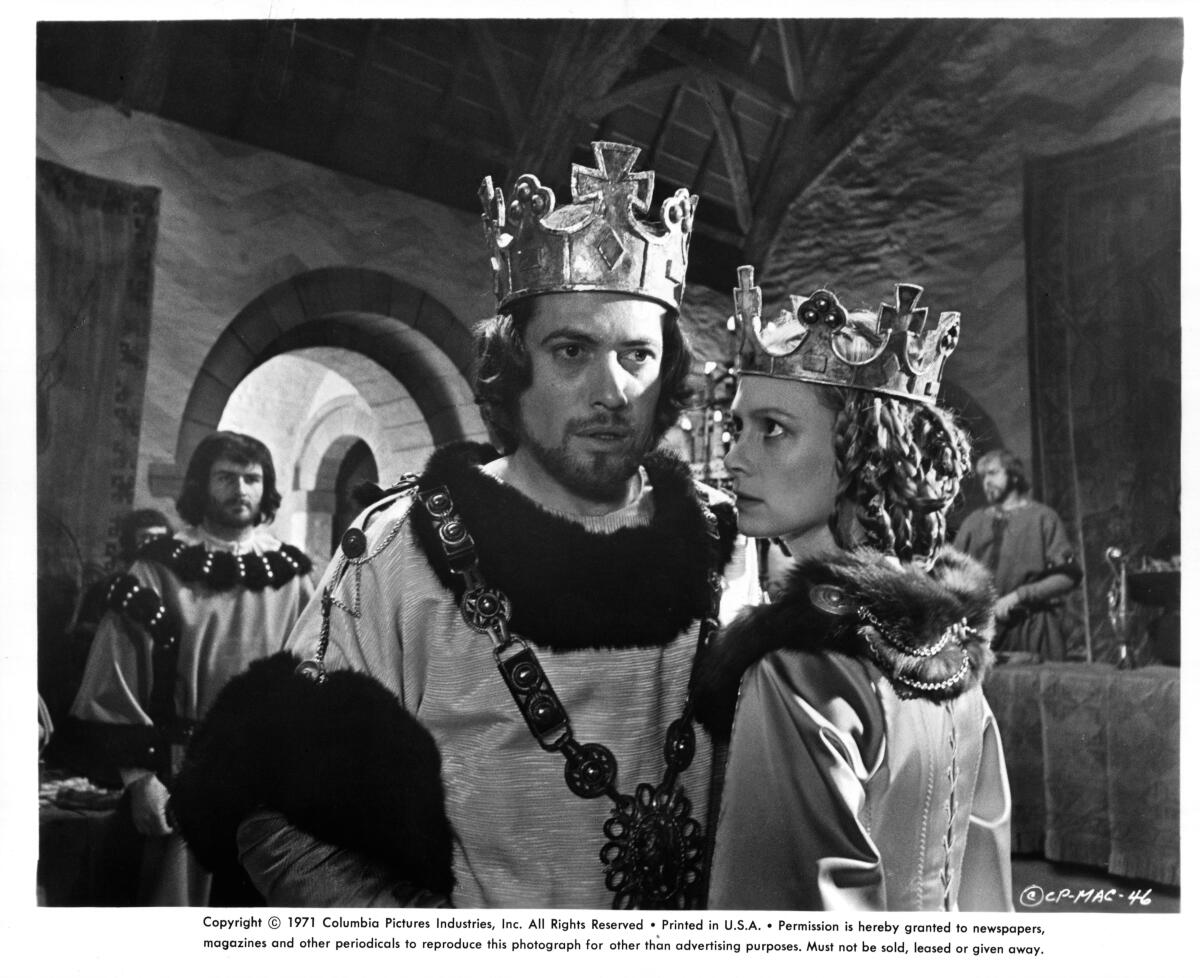
Welles’ “Chimes at Midnight” will always be a personal favorite, but film directors not working in English have an advantage in not being burdened with the care of Shakespeare’s verse. Soviet theater and film director Grigori Kozintsev’s “Hamlet” (1964) and “King Lear” (1970) represent triumphs of Shakespearean filmmaking. Akira Kurosawa’s “Throne of Blood,” his beguiling 1957 film spun in part from “Macbeth,” and “Ran,” his majestic 1985 epic drawn from “King Lear,” have the distinction of being autonomous movie masterpieces.
Coen, working with production designer Stefan Dechant and director of photography Bruno Delbonnel, gleans inspiration from this history. In keeping with Welles, Coen adopts a nonrealistic approach to the setting. The space of this new “Macbeth” is an aesthetic one, neither subject to the laws of the everyday nor antithetical to them.
Clean geometric lines and artful shadows predominate. The interplay of light and dark doesn’t quite achieve the painterly magnificence of what Kurosawa creates in “Throne of Blood,” but the spatial strategy has a Pythagorean elegance.
Unlike Welles, Coen avoids the impression that the action is unfolding on a would-be stage. This is a movie through and through. The tone is intimate, almost colloquial, yet Coen isn’t shy when it comes to the great speeches. He neither relies on voiceovers nor films them obliquely à la Polanski, who gives us the poetry en passant. Coen knows this is a main reason we’re here.
Denzel Washington and Frances McDormand play Macbeth and Lady Macbeth in Joel Coen’s magisterially bleak Shakespeare adaptation.
Washington is no stranger to iambic pentameter, but his Macbeth is more piercing in his sighs than in his utterances. The monotone he adopts to capture his character’s spiritual immolation is dreary to listen to. McDormand, who played Lady Macbeth in an uneven production at Berkeley Rep, is only effective when her feet are firmly planted in realism.
Steadfast in the conversational tone that Coen establishes for them, Washington and McDormand are punctilious in making their lines sound natural. Their psychology rings true but Shakespeare’s music is muted.
Fortunately, the first-rate supporting cast is more tuneful. But the jazz in Coen’s “Macbeth” comes mostly from the directing. That’s where the film is at its freest. I was moved more by the sight of Lady Macbeth‘s body at the bottom of a vertiginous set of steps than I was by either McDormand’s wailing rendition of the sleepwalking scene or Washington’s exhausted handling of Macbeth’s “Tomorrow, and tomorrow, and tomorrow” soliloquy.
A theatrical superstition holds that it is unlucky to utter the word “Macbeth” inside a theater, but the tragedy may be cursed in a different way: It is exceedingly difficult to prevent the sensational theatricality of the play from overwhelming the tricky dramatic path of a protagonist who goes from being a glamorous military hero to a pathological butcher.
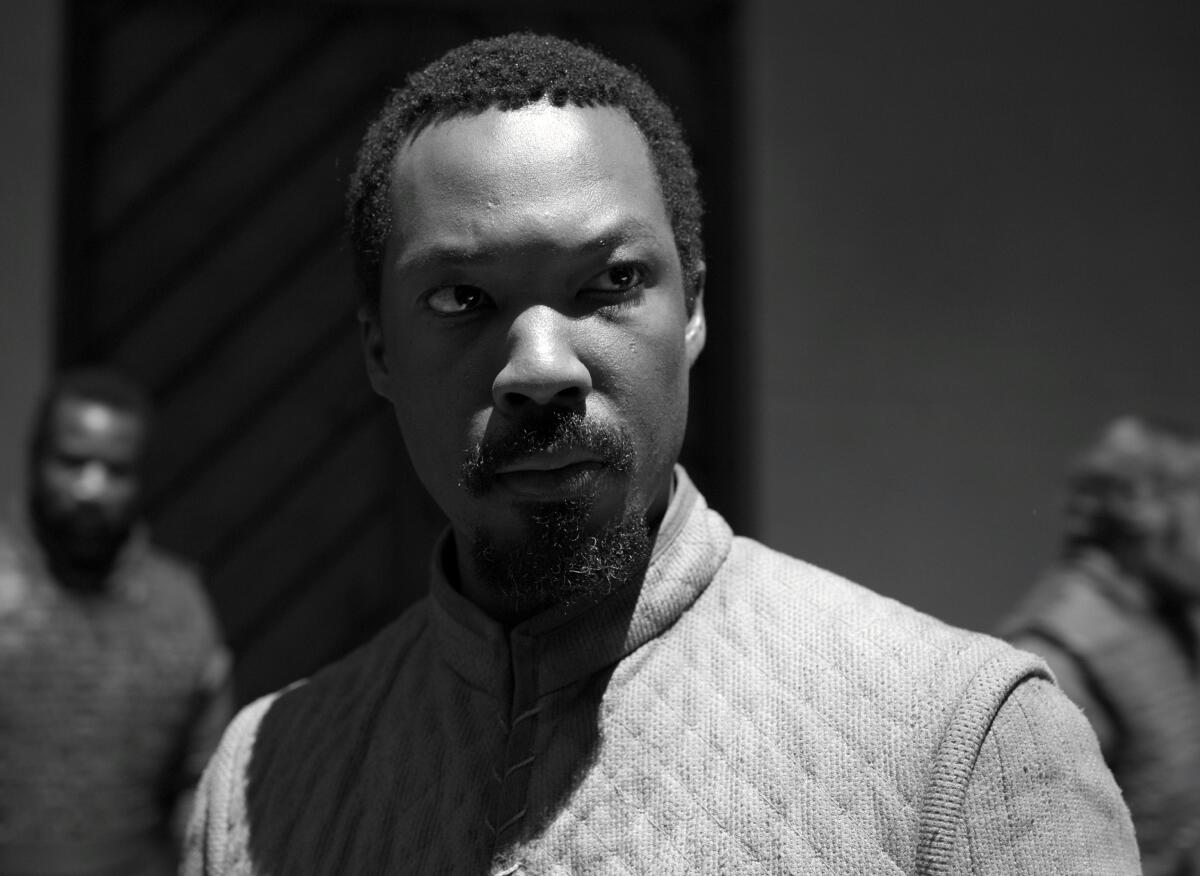
Often by the end of “Macbeth” the audience is too numb to feel much of anything. But I felt a sharp twinge of pathos when, in the final moments of the film, the crown that Macbeth lost his soul to attain is flung violently into the sky by the sword of Macduff (an excellent Corey Hawkins).
Coen captures the shortsightedness of vaulting ambition in a single image. But the film doesn’t end there. Ross, who always seems to appear when news is breaking, is already hastening the next chapter with his malevolent agenda. (Not for nothing does he have his own scene with the supernaturally gifted Hunter.) I won’t spoil the ending, but Shakespeare would not have risked offending his royal patron, King James I, with this plot twist, even if he couldn’t have helped secretly admiring the enterprising boldness.
The sequel to this story might entice Ethan to rejoin his brother Joel on a murky Coen brothers immorality tale. Murder and mayhem without the blank verse. But in the meantime, a stunning “Macbeth” has been added to the tradition.
More to Read
Only good movies
Get the Indie Focus newsletter, Mark Olsen's weekly guide to the world of cinema.
You may occasionally receive promotional content from the Los Angeles Times.
